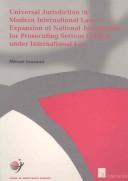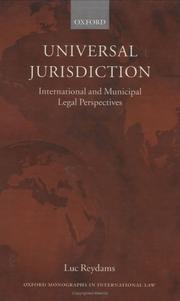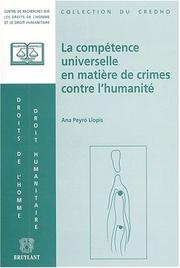| Listing 1 - 7 of 7 |
Sort by
|
Book
ISBN: 0190948345 0190948329 0190948337 Year: 2019 Publisher: New York, NY : Oxford University Press,
Abstract | Keywords | Export | Availability | Bookmark
 Loading...
Loading...Choose an application
- Reference Manager
- EndNote
- RefWorks (Direct export to RefWorks)
Extraterritorial jurisdiction stands at the juncture of international law and animal law and promises to open a path to understanding and resolving the global problems that challenge the core of animal law. As corporations have relocated and the animal industry (agriculture, medical research, entertainment, etc.) has dispersed its production facilities across the territories of multiple states, regulatory gaps and fears of a race to the bottom have become a pressing issue of global policy. 'Protecting Animals Within and Across Borders' provides enough background to allow readers to understand why extraterritorial jurisdiction must respond to these developments, counters objections that readers might raise, and describes how to improve animal law in tandem.
Animal welfare --- Exterritoriality. --- Universal jurisdiction. --- Law and globalization. --- Law and legislation. --- Globalization and law --- Globalization --- Principle of universality (International law) --- Quasi-universal jurisdiction --- Universal criminal jurisdiction --- Universality principle (International law) --- Criminal jurisdiction --- Jurisdiction (International law) --- Exterritoriality --- Extraterritoriality --- Jurisdiction, Exterritorial --- International law --- Capitulations --- Universal jurisdiction --- Animal rights --- Humane laws --- Law and legislation
Book
ISBN: 1351231979 1351231995 1351231987 9781351231978 9781351231992 9781351231985 9781351231961 1351231960 9780815378587 0815378580 9781032178318 Year: 2019 Publisher: Abingdon, Oxon ; New York, NY : Routledge,
Abstract | Keywords | Export | Availability | Bookmark
 Loading...
Loading...Choose an application
- Reference Manager
- EndNote
- RefWorks (Direct export to RefWorks)
Questions of legal extraterritoriality figure prominently in scholarship on legal pluralism, transnational legal studies, international investment law, international human rights law, state responsibility under international law, and a large number of other areas. Yet many accounts of extraterritoriality make little effort to grapple with its thorny conceptual history, shifting theoretical valence, and complex political roots and ramifications. This book brings together thirteen scholars of law, history, and politics in order to reconsider the history, theory, and contemporary relevance of legal extraterritoriality. Situating questions of extraterritoriality in a set of broader investigations into state-building, imperialist rivalry, capitalist expansion, and human rights protection, it tracks the multiple meanings and functions of a distinct and far-reaching mode of legal authority. The fundamental aim of the volume is to examine the different geographical contexts in which extraterritorial regimes have developed, the political and economic pressures in response to which such regimes have grown, the highly uneven distributions of extraterritorial privilege that have resulted from these processes, and the complex theoretical quandaries to which this type of privilege has given rise. The bookwill be of considerable interest to scholars in law, history, political science, socio-legal studies, international relations, and legal geography.
Exterritoriality. --- Universal jurisdiction. --- Capitulations --- History. --- Exterritoriality --- Universal jurisdiction --- Principle of universality (International law) --- Quasi-universal jurisdiction --- Universal criminal jurisdiction --- Universality principle (International law) --- Criminal jurisdiction --- Jurisdiction (International law) --- Extraterritoriality --- Jurisdiction, Exterritorial --- International law --- History --- Law and legislation --- Exterritorialité --- Compétence universelle --- Capitulations (droit international) --- Histoire --- Political science. --- Law and legislation. --- Science politique --- Droit --- Exterritorialité --- Compétence universelle

ISBN: 9050953662 9789050953665 Year: 2005 Volume: 19 Publisher: Antwerp: Intersentia,
Abstract | Keywords | Export | Availability | Bookmark
 Loading...
Loading...Choose an application
- Reference Manager
- EndNote
- RefWorks (Direct export to RefWorks)
Human rights --- International law --- Criminal courts. --- International crimes. --- Jurisdiction (International law) --- Universal jurisdiction. --- Mensenrechten. --- Rechtsmacht. --- Strafvervolging. --- Jurisdiction (International law). --- Criminal courts --- International crimes --- Universal jurisdiction --- Principle of universality (International law) --- Quasi-universal jurisdiction --- Universal criminal jurisdiction --- Universality principle (International law) --- Domestic jurisdiction --- International jurisdiction --- Jurisdiction, Domestic --- Jurisdiction, International --- Crimes, International --- International crime --- International offenses --- Courts, Criminal --- Criminal jurisdiction --- Exterritoriality --- Arbitration (International law) --- International courts --- Crime --- Correctional institutions --- Courts --- Criminal justice, Administration of --- Criminal procedure --- Crimes contre l'humanité --- Droit international humanitaire

ISBN: 0199251622 9780199251629 Year: 2003 Publisher: Oxford: Oxford university press,
Abstract | Keywords | Export | Availability | Bookmark
 Loading...
Loading...Choose an application
- Reference Manager
- EndNote
- RefWorks (Direct export to RefWorks)
International law --- Criminal jurisdiction. --- Jurisdiction (International law) --- Exterritoriality. --- Criminal jurisdiction --- Exterritoriality --- Domestic jurisdiction --- International jurisdiction --- Jurisdiction, Domestic --- Jurisdiction, International --- Arbitration (International law) --- International courts --- Extraterritoriality --- Jurisdiction, Exterritorial --- Capitulations --- Universal jurisdiction --- Conflict of criminal jurisdiction --- Conflict of laws --- Criminal law --- Criminal procedure --- Exterritorial crime --- Jurisdiction --- International criminal law --- Law and legislation --- Universal jurisdiction. --- Principle of universality (International law) --- Quasi-universal jurisdiction --- Universal criminal jurisdiction --- Universality principle (International law)
Book
ISBN: 9789462650541 9462650535 9789462650534 9462650543 Year: 2015 Publisher: The Hague : T.M.C. Asser Press : Imprint: T.M.C. Asser Press,
Abstract | Keywords | Export | Availability | Bookmark
 Loading...
Loading...Choose an application
- Reference Manager
- EndNote
- RefWorks (Direct export to RefWorks)
This book is about the combating of impunity from international criminality, with a special focus on the role of Sierra Leone as a pioneer in the progressive application of international criminal law in the African region. Despite Sierra Leone’s role, the country’s profile, both in terms of the incorporation and application of the doctrine of universal jurisdiction, is deficient in several major respects falling far short of its dual international obligation not to provide safe havens from justice for perpetrators of international crimes and to combat impunity from such crimogenic acts. Based on his vast experience in this field, the author provides the reader with a seminal scholarly work articulating the existing state of the law in Sierra Leone and highlighting the deficiencies in the law and factors inhibiting the exercise of universal jurisdiction in this UN member state. He also proposes substantive and procedural law reforms in the state’s relevant law on the subject. The book is recommended reading for practitioners and scholars in international criminal law and related disciplines. Its accessibility is highly enhanced by relevant footnotes, tables and summaries of each chapter. Justice Bankole Thompson holds a Ph.D. in Law from the University of Cambridge. He is Professor Emeritus of Criminal Justice Studies, Eastern Kentucky University, USA. He was a Judge of the Special Court for Sierra Leone. Currently, Justice Thompson is a Judge of the Residual Special Court for Sierra Leone, and a fellow of the Sierra Leone Institute of International Law.
Law. --- International Criminal Law. --- International Humanitarian Law, Law of Armed Conflict. --- Human Rights. --- Droit --- Human rights. --- International humanitarian law. --- International criminal law. --- Criminal law --- Universal jurisdiction. --- Principle of universality (International law) --- Quasi-universal jurisdiction --- Universal criminal jurisdiction --- Universality principle (International law) --- Crime --- Crimes and misdemeanors --- Criminals --- Law, Criminal --- Penal codes --- Penal law --- Law and legislation --- Legal status, laws, etc. --- Criminal jurisdiction --- Jurisdiction (International law) --- Exterritoriality --- Pleas of the crown --- Public law --- Criminal justice, Administration of --- Criminal procedure --- International Criminal Law . --- Basic rights --- Civil rights (International law) --- Human rights --- Rights, Human --- Rights of man --- Human security --- Transitional justice --- Truth commissions --- Humanitarian conventions --- International humanitarian law --- War (International law) --- Criminal law, International --- ICL (International criminal law) --- International law --- International crimes
Book
ISBN: 019765892X 0197658903 9780197658895 9780197658901 0197658911 Year: 2023 Publisher: New York, NY : Oxford University Press,
Abstract | Keywords | Export | Availability | Bookmark
 Loading...
Loading...Choose an application
- Reference Manager
- EndNote
- RefWorks (Direct export to RefWorks)
Intolerant Justice examines how national legal systems handle dilemmas of international cooperation: Should our citizens stand trial in foreign courts that do not meet our standards? Should we extradite offenders to countries with a poor human rights record? Should we enforce rulings issued by foreign judges whose values are different from our own? This book argues that ethnocentrism-the human tendency to divide the world into superior in-groups and inferior out-groups-fuels fear and mistrust of foreign justice and sparks domestic political controversies: while skeptics portray foreign legal systems as a danger and threat, others dismiss these concerns. The book traces this dynamic in a range of cases, including the American hesitation to allow criminal trials of troops in the courts of NATO countries; the debate over the proper venue for trying Europeans who joined ISIS as foreign fighters; the dilemma of extradition to China; the British debate over extradition to the U.S. and the EU; the European wariness toward U.S. civil judgments; the American-British divide over free speech and libel suits; the establishment of mutual legal assistance treaties; and cooperation against child abduction. Despite the growing role of law and courts in international politics, Intolerant Justice suggests that cooperation among legal systems often meets resistance-and it shows how this resistance can be overcome.
Exterritoriality --- Legal status --- Extraterritoriality --- Jurisdiction, Exterritorial --- International law --- Capitulations --- Universal jurisdiction --- Law and legislation --- national law. --- international cooperation. --- legal status. --- cross-border cooperation. --- judicial cooperation. --- rule of law. --- Exterritoriality. --- Noncitizens --- Criminal justice, Administration of --- Judgments, Foreign --- Judicial assistance --- Conflict of laws --- Legal status, laws, etc. --- International cooperation --- Choice of law --- Intermunicipal law --- International law, Private --- International private law --- Private international law --- Law --- Legal polycentricity --- Civil procedure --- Criminal procedure --- Foreign judgments --- Principle of universality (International law) --- Quasi-universal jurisdiction --- Universal criminal jurisdiction --- Universality principle (International law) --- Criminal jurisdiction --- Jurisdiction (International law) --- Aliens --- Enemy aliens --- Expatriates --- Foreign population --- Foreign residents --- Foreigners --- Illegal aliens --- Illegal immigrants --- Non-citizens --- Resident aliens --- Unauthorized immigrants --- Undocumented aliens --- Undocumented immigrants --- Unnaturalized foreign residents --- Persons --- Civil law --- Universal jurisdiction. --- Judgments, Foreign. --- Judicial assistance. --- Conflict of laws. --- International cooperation.

ISBN: 2802716980 9782802716983 Year: 2003 Volume: 3 Publisher: Bruxelles: Bruylant,
Abstract | Keywords | Export | Availability | Bookmark
 Loading...
Loading...Choose an application
- Reference Manager
- EndNote
- RefWorks (Direct export to RefWorks)
Human rights --- Law of armed conflicts. Humanitarian law --- Autorité compétente --- Bevoegdheid (Recht) --- Competence (Legal authority) --- Competent authority --- Compétence (Droit) --- Compétence administrative et judiciaire --- Conflict of criminal jurisdiction --- Conflict of laws -- Criminal law --- Conflict of laws -- Criminal procedure --- Conflit d'attribution --- Conflit de compétence --- Conflit de juridictions pénales --- Conflits d'attribution --- Conflits de compétence --- Crimes against humanity --- Crimes contre l'humanité --- Criminal jurisdiction --- Criminal law -- Conflict of laws --- Criminal procedure -- Conflict of laws --- Criminele rechtsmacht --- Droit international et droit interne --- Droit international privé -- Droit pénal --- Droit international privé -- Procédure pénale --- Droit pénal (Droit international privé) --- Droit pénal international --- Droit pénal international privé --- Dualisme juridictionnel --- Dualité de juridictions --- Exterritorial crime --- Internationaal recht en intern recht --- International and municipal law --- International criminal justice --- Juridiction pénale --- Misdaden tegen de mensheid --- Processen (Recht)(Misdaden tegen de mensheid) --- Procès (Droit)(Crimes contre l'humanité) --- Procédure pénale (Droit international privé) --- Séparation des autorités administrative et judiciaire --- Trials (Crimes against humanity) --- Procès (Crimes contre l'humanité) --- Conflict of laws --- Lex loci delicti --- 341.48 --- 341 <493> --- 341.32 --- Misdaden tegen de mensheid. Volkerenmoord --- Internationaal recht. Volkenrecht --(algemeen)--België --- Regels voor oorlogsvoering. Humanitair recht --- Crimes against humanity. --- Criminal jurisdiction. --- Universal jurisdiction. --- Lex loci delicti. --- 341.32 Regels voor oorlogsvoering. Humanitair recht --- 341 <493> Internationaal recht. Volkenrecht --(algemeen)--België --- 341.48 Misdaden tegen de mensheid. Volkerenmoord --- Droit pénal international --- Procès (Crimes contre l'humanité) --- Compétence (Droit) --- Universal jurisdiction --- Principle of universality (International law) --- Quasi-universal jurisdiction --- Universal criminal jurisdiction --- Universality principle (International law) --- Jurisdiction (International law) --- Exterritoriality --- Criminal law --- Criminal procedure --- Jurisdiction --- International criminal law --- Crime --- International crimes --- Genocide --- War crimes --- Droit international pénal --- International Criminal Court --- Conflict of laws - Lex loci delicti
| Listing 1 - 7 of 7 |
Sort by
|

 Search
Search Feedback
Feedback About UniCat
About UniCat  Help
Help News
News